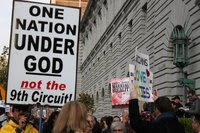
Today the California Supreme Court will hold hearings on the issue certified to it by the Ninth Circuit Court of Appeals in
Perry v. Schwarzenegger of whether or not the proponents of Proposition 8 have standing to appeal the decision rendered by the U.S. District Court that found Proposition 8 to be unconstitutional. As noted on this blog quite some time ago, the federal court precedents for non-governmental entities and organizations having the right to appeal referendum issues is not good. Should the California Supreme Court rule against the Prop 8 supporters on standing, the case would potentially be all but over with the U.S. Supreme Court being able to easily side step any attempted appeal by the religiously motivated Prop 8 hate merchants. Here are some highlights from the
Los Angeles Times on today's hearings:
The California Supreme Court will hear arguments Tuesday on whether conservatives who sponsored Proposition 8 are entitled to appeal last year's federal ruling that overturned the 2008 same-sex marriage ban.
The court's ruling, due 90 days after argument, will determine whether all initiative sponsors in California are legally entitled to defend their measures in state court when the governor and the attorney general refuse.
If the court rules against the initiative backers, then a federal appeals court is more likely to rule that ProtectMarriage.com, the sponsor of Proposition 8, also lacks standing under federal law and "Proposition 8 dies because no one will defend it," said Vikram Amar, UC Davis constitutional law professor.
"Just because someone sponsors an initiative doesn't mean they are good representatives of the voters, because the voters never chose the sponsors," he said.
Gay rights groups want the state high court to deny standing to backers of ballot measures. That could avoid a constitutional showdown on Proposition 8 that gays might lose before the U.S. Supreme Court. The League of Women Voters has urged the California court to deny standing to initiative sponsors, as has Atty. Gen. Kamala Harris.
The U.S. 9th Circuit Court of Appeals asked the California court to clarify whether state law gives initiative backers special status to defend measures in court, but the appeals court won't be bound by what the California court determines.
Still the appeals court could use the state ruling to buttress a finding that Proposition 8's backers also have standing under federal law.
Strict legal rules about who has standing — the right to pursue a case — have ended many high-profile constitutional disputes in federal courts. Federal judges in recent years have embraced the narrow use of standing to limit the kinds of cases that can be brought. Under federal law, a person must have suffered an actual injury, among other requirements, to have standing in court. California courts have been more flexible in granting standing.
If the 9th Circuit determines that ProtectMarriage has standing, a three-judge 9th Circuit panel is likely to overturn Proposition 8 on constitutional grounds, and the case will probably then go to the U.S. Supreme Court. But the U.S. Supreme Court could reject the appeal on grounds of standing, limiting the case's effect to California.
Both Santa Clara's Uelmen and UC Davis' Amar said they would not be surprised if the U.S. Supreme Court ducked the constitutional issues by denying standing to ProtectMarriage and avoiding a ruling that would affect the rest of the country.
 Today the California Supreme Court will hold hearings on the issue certified to it by the Ninth Circuit Court of Appeals in Perry v. Schwarzenegger of whether or not the proponents of Proposition 8 have standing to appeal the decision rendered by the U.S. District Court that found Proposition 8 to be unconstitutional. As noted on this blog quite some time ago, the federal court precedents for non-governmental entities and organizations having the right to appeal referendum issues is not good. Should the California Supreme Court rule against the Prop 8 supporters on standing, the case would potentially be all but over with the U.S. Supreme Court being able to easily side step any attempted appeal by the religiously motivated Prop 8 hate merchants. Here are some highlights from the Los Angeles Times on today's hearings:
Today the California Supreme Court will hold hearings on the issue certified to it by the Ninth Circuit Court of Appeals in Perry v. Schwarzenegger of whether or not the proponents of Proposition 8 have standing to appeal the decision rendered by the U.S. District Court that found Proposition 8 to be unconstitutional. As noted on this blog quite some time ago, the federal court precedents for non-governmental entities and organizations having the right to appeal referendum issues is not good. Should the California Supreme Court rule against the Prop 8 supporters on standing, the case would potentially be all but over with the U.S. Supreme Court being able to easily side step any attempted appeal by the religiously motivated Prop 8 hate merchants. Here are some highlights from the Los Angeles Times on today's hearings:
No comments:
Post a Comment